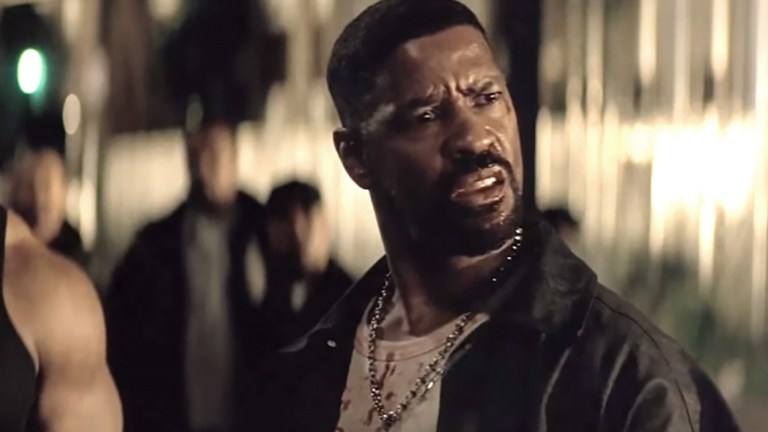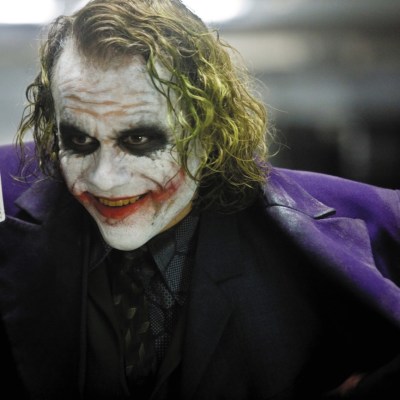Why Training Day’s King Kong Speech Is One of the Best Movie Monologues Ever
Denzel Washington adlibbed the central line in his King Kong declaration in Training Day, but it made all the difference.

Training Day’s “King Kong” monologue stands tall among the great speeches of cinema. Denzel Washington elevates the iambic pentameter of Iago, the villain of William Shakespeare’s Othello, to syncopated street rhythms. It is on par with Marlon Brando’s reflections on the horrors of war as Col. Kurtz in Apocalypse Now, it is the inverse of Gregory Peck’s monologues as Atticus Finch in To Kill A Mockingbird, and it ranks with Joe Pesci’s “Do you think I’m funny?” scene in Goodfellas or Groucho Marx’s breakdown in the middle of reconciliation in Duck Soup. But the single line of dialogue which hits it home wasn’t in David Ayer’s screenplay. It was pure Denzel.
“King Kong ain’t got shit on me,” LAPD Det. Sgt. Alonzo Harris declares in the most memorable scene in Training Day. Washington improvised the line in the heat of the moment. He’d earlier improvised a scene where he rubbed two handguns together as a threat. This is expert foreshadowing to the character breakdown, allowing Washington to evoke Humphrey Bogart’s Capt. Queeg, who fiddled with ball-bearings under cross-examination in The Caine Mutiny.
Before this moment, Alonzo had an iron grip over the neighborhood he patrols. He hassled out-of-towners for free weed, smokes, and pipes, and had his breakfast tabs paid with cash to table. And in this scene, he’s just made a lifesaving score and some “disloyal bitch-ass fool” gang member shuts him down, siding with a white rookie cop.
Alonzo put 13 years into this job, and he’s got a total of 15,000 man years in sentences under his belt. Yet he’s also been marked for death by the Russian mob and time is running out when he invokes Hollywood’s giant ape. Washington wears these contradictions on his face, playing Alonzo like he’s been both ordained and earned his exalted position. He throws down challenges, pulls emotional punches, and keeps the other actors tightly involved in the scene.
Not all of Washington’s dynamics are limited to the craft of acting. Some of Alonzo’s lines come across like a Tom Morello guitar run in a Rage Against the Machine song. Denzel drives beautiful dissonances without a blue note. And he does the whole thing two feet from an imposing Terry Crews, who stands there like a giant Marshall amp ready to knock him off his feet.
The monologue is more than engaging, it is arresting. And it ends in an unexpected place, certainly not foreseen by the audience or the players when it begins. Alonzo is shouting for his life here. The stakes of “go to jail or go home” are just the opening ante of the cop’s wager of controlling his neighbors. And after the rousing wakeup call ends, the crowd’s reaction recalls the conclusion of Bruce Springsteen’s street anthem “Jungleland,” which reads “and they wind up wounded, not even dead.”
Training Day tells the story of a veteran police detective, undercover cop Alonzo, who babysits rookie narc cop Jake, played by Ethan Hawke, through his first day on the street. The role of Alonzo was the first villain Washington ever played. The actor had an onscreen reputation as an authentic hero. All his characters, even Pfc. Peterson in A Soldier’s Story, who shot a black sergeant and left him on the side of the road, had a code. There is a set of ethics and morals which the character stuck to, even in the face of a murder confession. By the ‘90s, Washington was a renowned role model in cinema.
For most of Training Day, he uses this reputation to his advantage. Denzel puts on his good guy voice and most charismatic smile, and Alonzo’s side glances are invitations. He’s got all the answers and knows how to impart wisdom. Even if you don’t want to hear it.
But it’s a beautiful ruse, and Washington has a ball playing the villain. Alonzo is a demon in a 1978 Monte Carlo lowrider. The devil’s got gold chains, black leather, and a badge. The road to hell is greased with bad intent. Alonzo doesn’t need a siren. He can stop traffic with a stare. He bends the law until it breaks, and is the guy you call to put in the fix. He rousts citizens for the cardio. Alonzo messes with people’s heads as a passing thought.
Meanwhile, Jake thinks the narco beat will put him on the fast track to detective grade. Alonzo is evaluating Jake to see if he’s got what it takes, and if he’ll take what he can get.
The grooming starts slowly. A couple of pulls on a marijuana pipe and a visit to an ex-cop whose pouring drinks for on-duty badges. Corruption is a slow process, especially with a hardheaded idealist. When Jake’s one “bad boy” story ends with an admission that he didn’t have sex with his “fine” training officer after a year in park because he’s “got a wife,” Denzel shoots back with “You got a dick.” And when Jake later confirms he’s not cool with killing and robbing drug dealers, his fate is sealed in Alonzo’s eyes: off-screen the older cop arranges it with a Mexican gang so Jake can take the fall.
Alonzo is on a deadline. He beat the wrong guy to death on a trip to Las Vegas, and the Russian mafia wants $1 million by the end of that day in payback. Alonzo had that money in a bag before Jake crashed in on his getaway, shooting him in the ass and leaving him stalled at the scene, which probably got Washington his Oscar.
Training Day is filled with memorable sequences: Snoop Dogg’s arrest is pure slapstick tragedy; Macy Gray sounds absolutely unearthly; who doesn’t have the urge to get high with Alonzo after watching him take the wheel so’s not to kill Jake’s buzz? But Alonzo kills it good when his life’s on the line.
When the gang leader Bone (Cle Sloan) sides with Jake during the film’s climactic moment, letting the rookie split with the cash he’ll use as evidence to bust Alonzo, it is a cultural divide. The white cop dissociates not only from the bad cop and from the Black community, but turns Alonzo’s defining declaration into some kind of psychotic breakdown. It is street legal, common sense on the block, now diluted for mass consumption. Alonzo is not wrong about anything except his partner. The motherfucker who just shot him in the ass.
Part of the reason the scene is so effective is because of the energy of where it was shot. Producers were warned the Imperial Courts housing project in Watts was too dangerous for production, but the neighborhood community wanted the film to be made. And they wanted it to be honest. Director Antoine Fuqua shot there anyway and cast neighborhood residents as extras or in small roles. It was the first time LA gangs allowed filmmaking on their turf, and Cle Shaheed Sloan, a former member of the Bloods who was the gang technical advisor, got cameos from real-life gang members, according to Fuqua on the DVD.
Washington is performing street theater in the round during his big speech, and he’s playing it to the most appreciative audience in the world. People are getting paid to be themselves and show their pain. It works like a chorus and it amplifies the tension. Alonzo is a tiger caught by the tail but with a lot of bite. To catch a wolf, you have to be a wolf, the narc cop believes. Spittle flies onto the pavement as Denzel forges himself into the eighth wonder of the world.
King Kong was the king of the jungle but met his death on city streets. “I run this place, you just live here,” Alonzo affirms with more truth than power allows. Undercover cops control the very concrete on the blocks they rule. Gangbangers operate at his discretion, with 23-hour lockdowns at Pelican Bay state prison as the collateral held against them. When the community turns away, it is both enfranchising and heartbreaking. The king is in exile but nothing will change. Alonzo knows this as he smokes his last cigarette. Someone else is coming in to take his place, and they will never be able to achieve what he believes he did, and only he can do. He goes out believing, affirming, and convinced he is winning. Redemption doesn’t even enter his mind. Washington saves his most diabolical laugh for himself. The wolf has been sheared.
It isn’t beauty which kills this beast, but a lethal dose of vanity. Alonzo may very well have been able to go a few rounds against the champion of Skull Island only hours before this moment. But sadly, afterward, this Los Angeles King Kong became no match for the Russian mafia.

